Fundamentals of EBP: Health and Social Care Communication Report
VerifiedAdded on 2020/12/30
|15
|4862
|411
Report
AI Summary
This report delves into the fundamentals of evidence-based practice (EBP) within health and social care, highlighting its crucial role in improving service user outcomes. The report explores the significance of EBP, emphasizing its impact on patient care through improved treatment procedures, enhanced safety, and quality service delivery. It outlines the purpose and process of conducting EBP, including the skills and qualities required for literature reviews, and analyzes the author's own skills in this area. The report further examines the importance of ethical research, communication skills for nurses, and communication between doctors and mental health patients. A literature review and a project proposal are included, alongside discussions on the positive impact of research on current practice and the author's learning experiences in the workplace. The report concludes by summarizing the critical role of effective communication in fostering positive patient outcomes and the importance of ethical considerations in healthcare research.
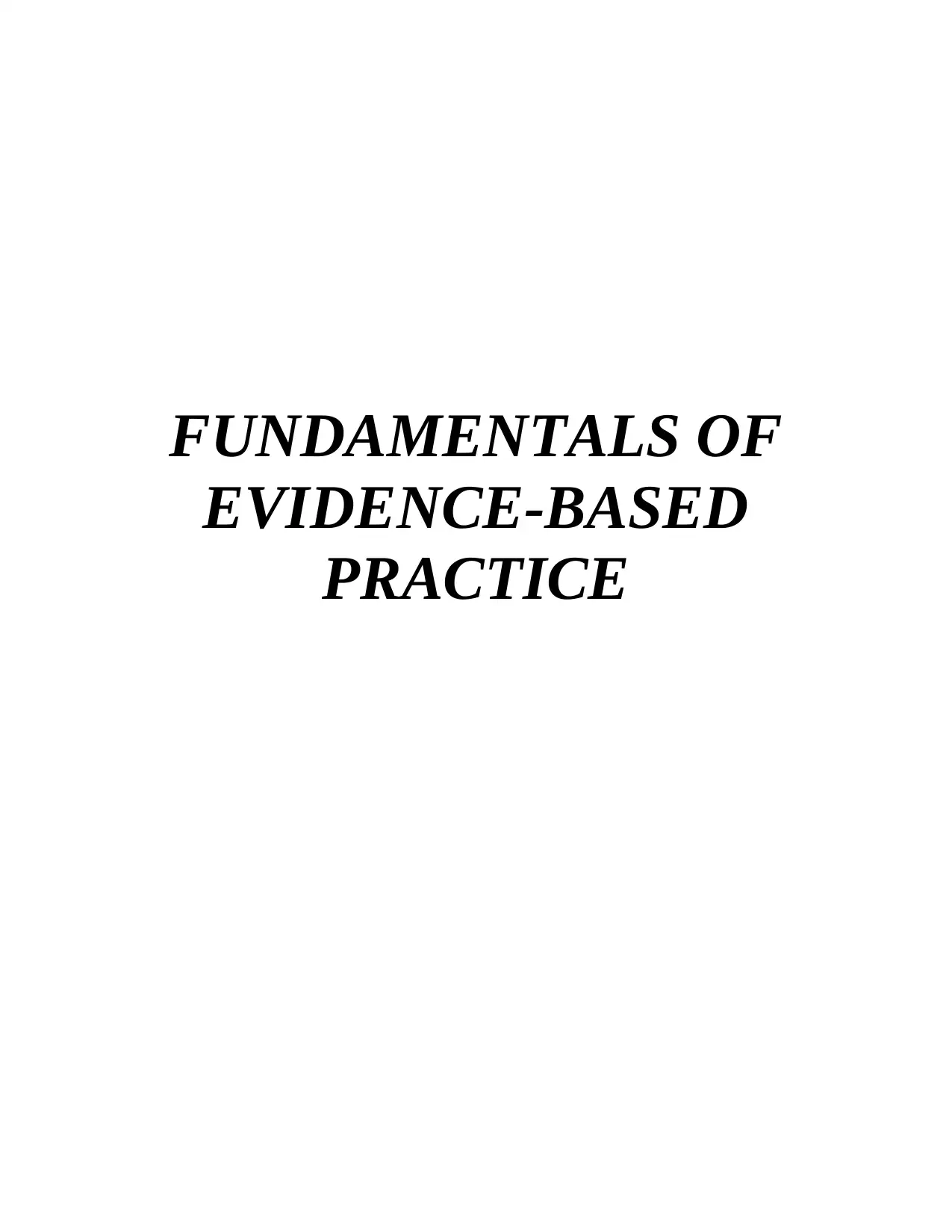
FUNDAMENTALS OF
EVIDENCE-BASED
PRACTICE
EVIDENCE-BASED
PRACTICE
Paraphrase This Document
Need a fresh take? Get an instant paraphrase of this document with our AI Paraphraser
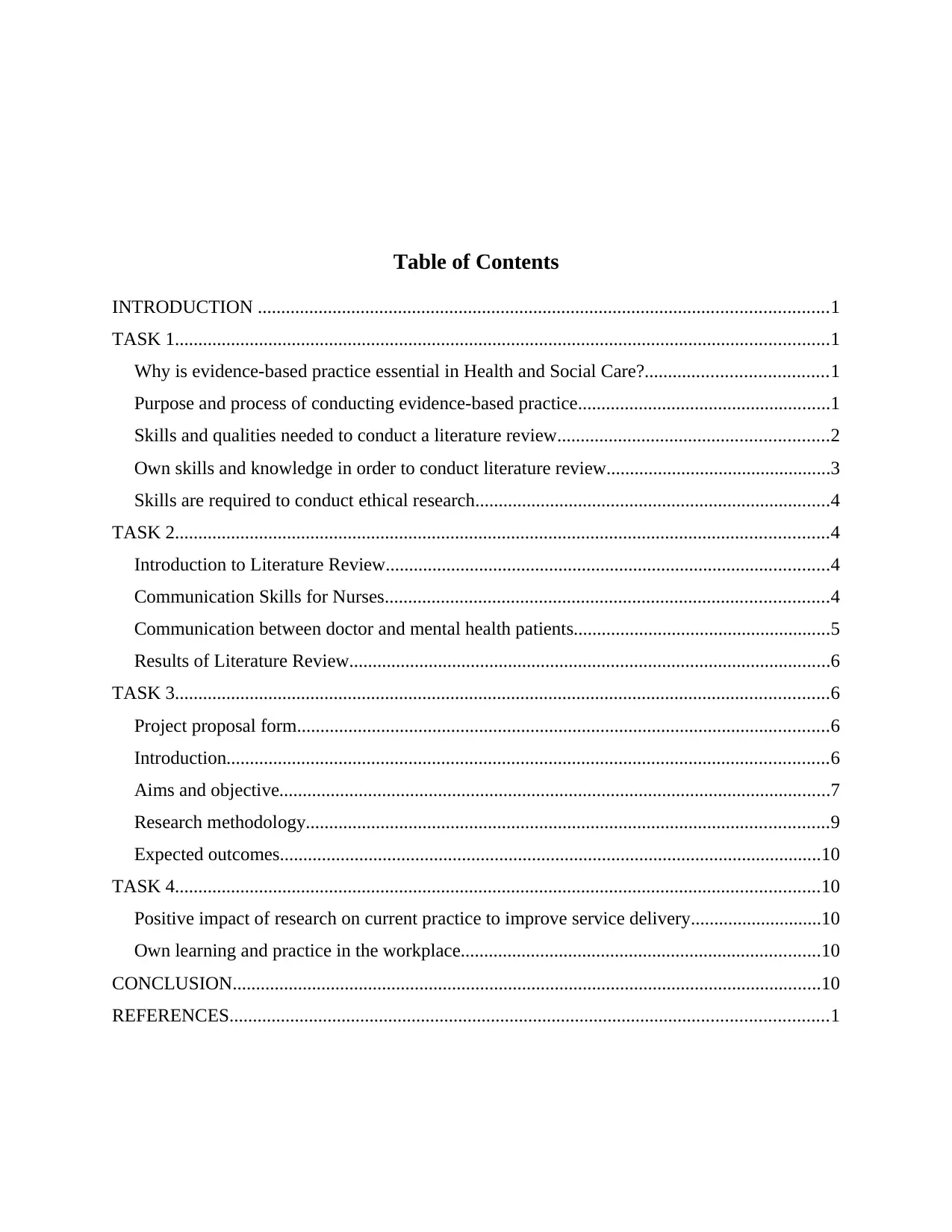
Table of Contents
INTRODUCTION ..........................................................................................................................1
TASK 1............................................................................................................................................1
Why is evidence-based practice essential in Health and Social Care?.......................................1
Purpose and process of conducting evidence-based practice......................................................1
Skills and qualities needed to conduct a literature review..........................................................2
Own skills and knowledge in order to conduct literature review................................................3
Skills are required to conduct ethical research............................................................................4
TASK 2............................................................................................................................................4
Introduction to Literature Review...............................................................................................4
Communication Skills for Nurses...............................................................................................4
Communication between doctor and mental health patients.......................................................5
Results of Literature Review.......................................................................................................6
TASK 3............................................................................................................................................6
Project proposal form..................................................................................................................6
Introduction.................................................................................................................................6
Aims and objective......................................................................................................................7
Research methodology................................................................................................................9
Expected outcomes....................................................................................................................10
TASK 4..........................................................................................................................................10
Positive impact of research on current practice to improve service delivery............................10
Own learning and practice in the workplace.............................................................................10
CONCLUSION..............................................................................................................................10
REFERENCES................................................................................................................................1
INTRODUCTION ..........................................................................................................................1
TASK 1............................................................................................................................................1
Why is evidence-based practice essential in Health and Social Care?.......................................1
Purpose and process of conducting evidence-based practice......................................................1
Skills and qualities needed to conduct a literature review..........................................................2
Own skills and knowledge in order to conduct literature review................................................3
Skills are required to conduct ethical research............................................................................4
TASK 2............................................................................................................................................4
Introduction to Literature Review...............................................................................................4
Communication Skills for Nurses...............................................................................................4
Communication between doctor and mental health patients.......................................................5
Results of Literature Review.......................................................................................................6
TASK 3............................................................................................................................................6
Project proposal form..................................................................................................................6
Introduction.................................................................................................................................6
Aims and objective......................................................................................................................7
Research methodology................................................................................................................9
Expected outcomes....................................................................................................................10
TASK 4..........................................................................................................................................10
Positive impact of research on current practice to improve service delivery............................10
Own learning and practice in the workplace.............................................................................10
CONCLUSION..............................................................................................................................10
REFERENCES................................................................................................................................1
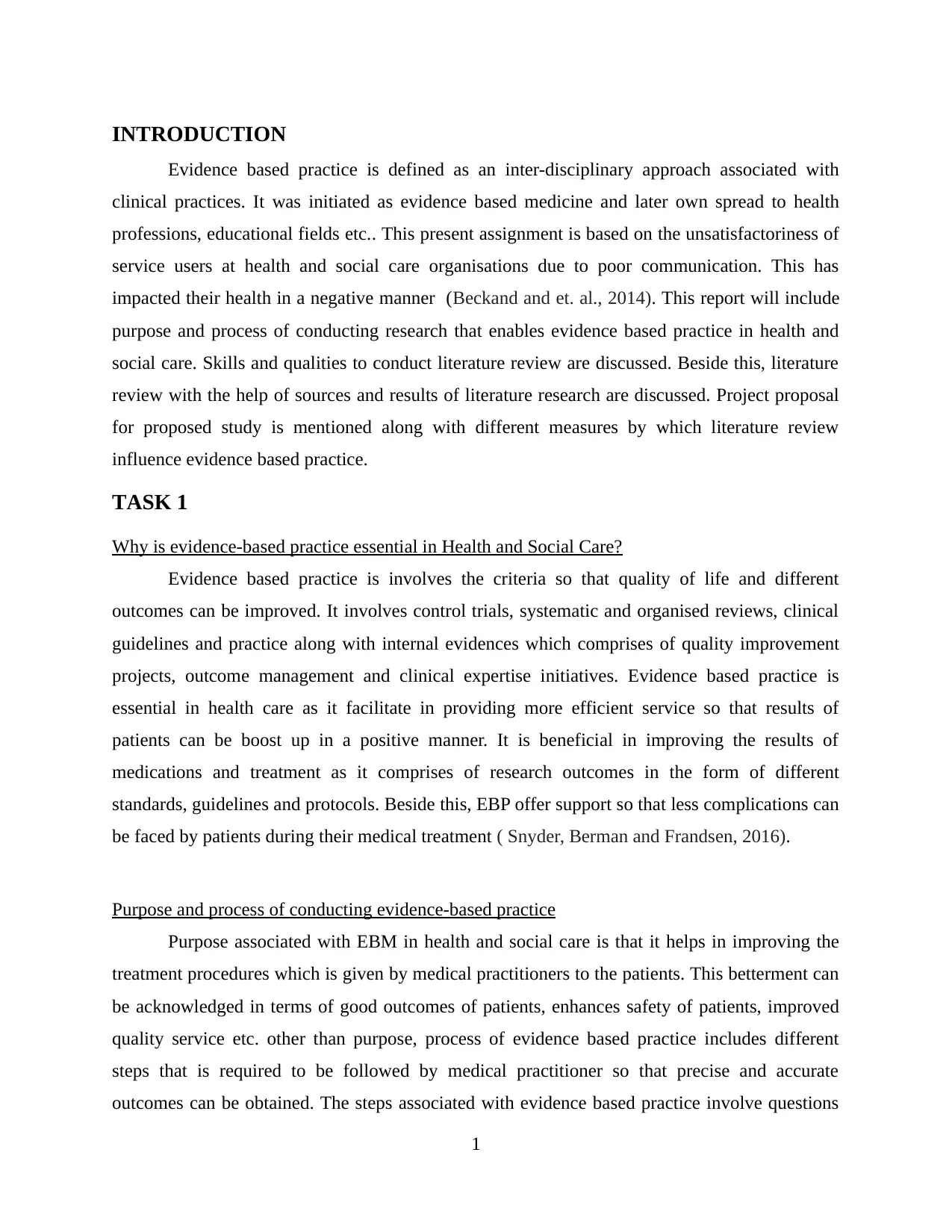
INTRODUCTION
Evidence based practice is defined as an inter-disciplinary approach associated with
clinical practices. It was initiated as evidence based medicine and later own spread to health
professions, educational fields etc.. This present assignment is based on the unsatisfactoriness of
service users at health and social care organisations due to poor communication. This has
impacted their health in a negative manner (Beckand and et. al., 2014). This report will include
purpose and process of conducting research that enables evidence based practice in health and
social care. Skills and qualities to conduct literature review are discussed. Beside this, literature
review with the help of sources and results of literature research are discussed. Project proposal
for proposed study is mentioned along with different measures by which literature review
influence evidence based practice.
TASK 1
Why is evidence-based practice essential in Health and Social Care?
Evidence based practice is involves the criteria so that quality of life and different
outcomes can be improved. It involves control trials, systematic and organised reviews, clinical
guidelines and practice along with internal evidences which comprises of quality improvement
projects, outcome management and clinical expertise initiatives. Evidence based practice is
essential in health care as it facilitate in providing more efficient service so that results of
patients can be boost up in a positive manner. It is beneficial in improving the results of
medications and treatment as it comprises of research outcomes in the form of different
standards, guidelines and protocols. Beside this, EBP offer support so that less complications can
be faced by patients during their medical treatment ( Snyder, Berman and Frandsen, 2016).
Purpose and process of conducting evidence-based practice
Purpose associated with EBM in health and social care is that it helps in improving the
treatment procedures which is given by medical practitioners to the patients. This betterment can
be acknowledged in terms of good outcomes of patients, enhances safety of patients, improved
quality service etc. other than purpose, process of evidence based practice includes different
steps that is required to be followed by medical practitioner so that precise and accurate
outcomes can be obtained. The steps associated with evidence based practice involve questions
1
Evidence based practice is defined as an inter-disciplinary approach associated with
clinical practices. It was initiated as evidence based medicine and later own spread to health
professions, educational fields etc.. This present assignment is based on the unsatisfactoriness of
service users at health and social care organisations due to poor communication. This has
impacted their health in a negative manner (Beckand and et. al., 2014). This report will include
purpose and process of conducting research that enables evidence based practice in health and
social care. Skills and qualities to conduct literature review are discussed. Beside this, literature
review with the help of sources and results of literature research are discussed. Project proposal
for proposed study is mentioned along with different measures by which literature review
influence evidence based practice.
TASK 1
Why is evidence-based practice essential in Health and Social Care?
Evidence based practice is involves the criteria so that quality of life and different
outcomes can be improved. It involves control trials, systematic and organised reviews, clinical
guidelines and practice along with internal evidences which comprises of quality improvement
projects, outcome management and clinical expertise initiatives. Evidence based practice is
essential in health care as it facilitate in providing more efficient service so that results of
patients can be boost up in a positive manner. It is beneficial in improving the results of
medications and treatment as it comprises of research outcomes in the form of different
standards, guidelines and protocols. Beside this, EBP offer support so that less complications can
be faced by patients during their medical treatment ( Snyder, Berman and Frandsen, 2016).
Purpose and process of conducting evidence-based practice
Purpose associated with EBM in health and social care is that it helps in improving the
treatment procedures which is given by medical practitioners to the patients. This betterment can
be acknowledged in terms of good outcomes of patients, enhances safety of patients, improved
quality service etc. other than purpose, process of evidence based practice includes different
steps that is required to be followed by medical practitioner so that precise and accurate
outcomes can be obtained. The steps associated with evidence based practice involve questions
1
⊘ This is a preview!⊘
Do you want full access?
Subscribe today to unlock all pages.

Trusted by 1+ million students worldwide
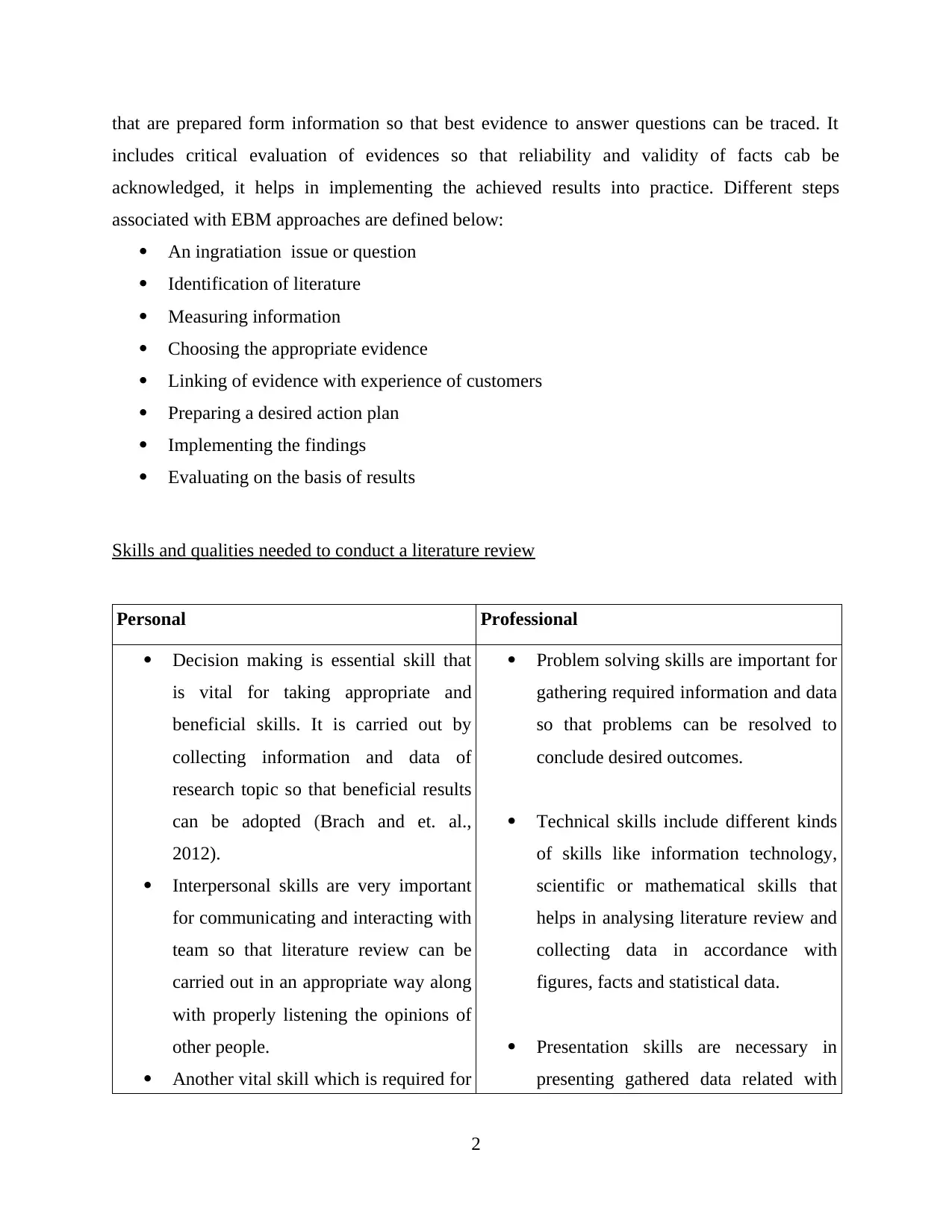
that are prepared form information so that best evidence to answer questions can be traced. It
includes critical evaluation of evidences so that reliability and validity of facts cab be
acknowledged, it helps in implementing the achieved results into practice. Different steps
associated with EBM approaches are defined below:
An ingratiation issue or question
Identification of literature
Measuring information
Choosing the appropriate evidence
Linking of evidence with experience of customers
Preparing a desired action plan
Implementing the findings
Evaluating on the basis of results
Skills and qualities needed to conduct a literature review
Personal Professional
Decision making is essential skill that
is vital for taking appropriate and
beneficial skills. It is carried out by
collecting information and data of
research topic so that beneficial results
can be adopted (Brach and et. al.,
2012).
Interpersonal skills are very important
for communicating and interacting with
team so that literature review can be
carried out in an appropriate way along
with properly listening the opinions of
other people.
Another vital skill which is required for
Problem solving skills are important for
gathering required information and data
so that problems can be resolved to
conclude desired outcomes.
Technical skills include different kinds
of skills like information technology,
scientific or mathematical skills that
helps in analysing literature review and
collecting data in accordance with
figures, facts and statistical data.
Presentation skills are necessary in
presenting gathered data related with
2
includes critical evaluation of evidences so that reliability and validity of facts cab be
acknowledged, it helps in implementing the achieved results into practice. Different steps
associated with EBM approaches are defined below:
An ingratiation issue or question
Identification of literature
Measuring information
Choosing the appropriate evidence
Linking of evidence with experience of customers
Preparing a desired action plan
Implementing the findings
Evaluating on the basis of results
Skills and qualities needed to conduct a literature review
Personal Professional
Decision making is essential skill that
is vital for taking appropriate and
beneficial skills. It is carried out by
collecting information and data of
research topic so that beneficial results
can be adopted (Brach and et. al.,
2012).
Interpersonal skills are very important
for communicating and interacting with
team so that literature review can be
carried out in an appropriate way along
with properly listening the opinions of
other people.
Another vital skill which is required for
Problem solving skills are important for
gathering required information and data
so that problems can be resolved to
conclude desired outcomes.
Technical skills include different kinds
of skills like information technology,
scientific or mathematical skills that
helps in analysing literature review and
collecting data in accordance with
figures, facts and statistical data.
Presentation skills are necessary in
presenting gathered data related with
2
Paraphrase This Document
Need a fresh take? Get an instant paraphrase of this document with our AI Paraphraser
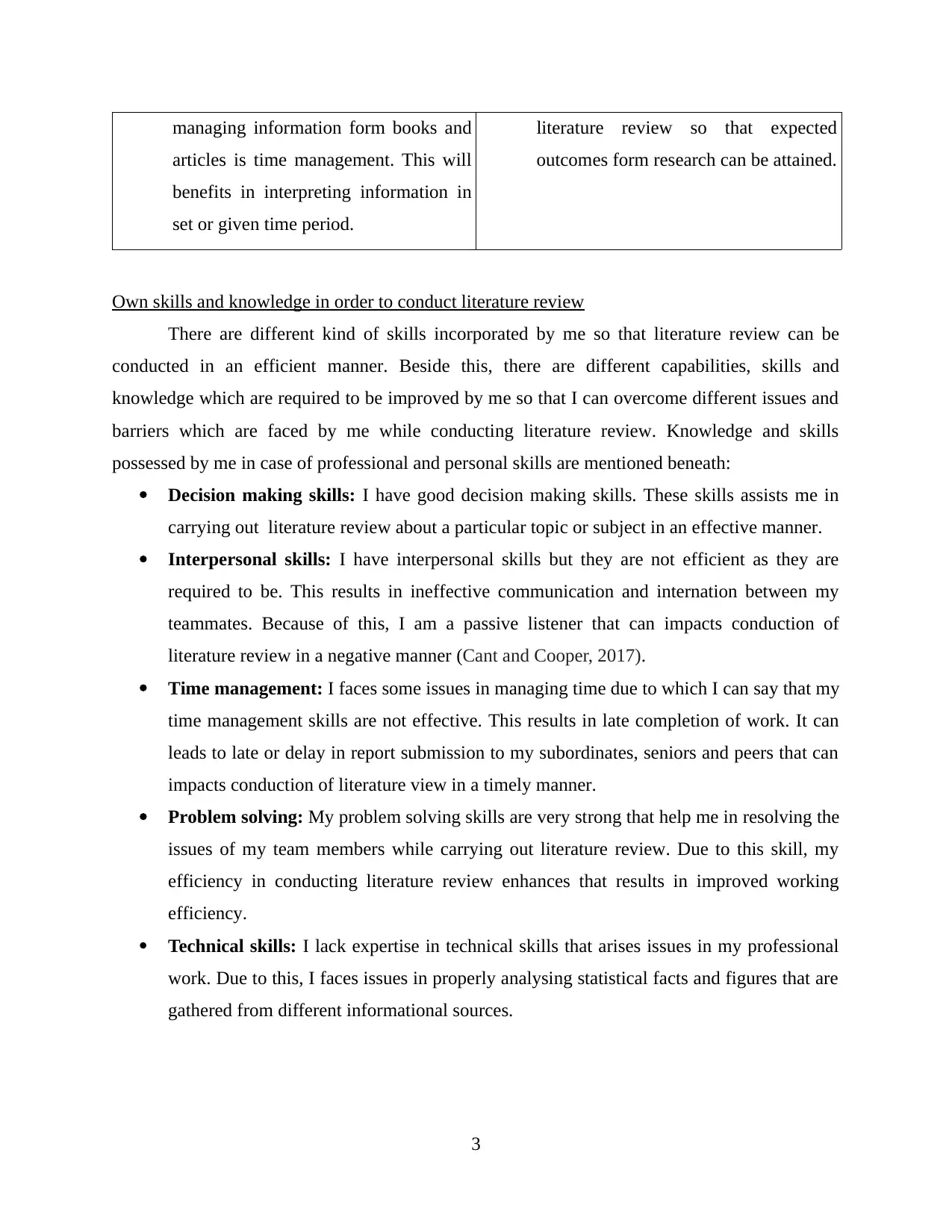
managing information form books and
articles is time management. This will
benefits in interpreting information in
set or given time period.
literature review so that expected
outcomes form research can be attained.
Own skills and knowledge in order to conduct literature review
There are different kind of skills incorporated by me so that literature review can be
conducted in an efficient manner. Beside this, there are different capabilities, skills and
knowledge which are required to be improved by me so that I can overcome different issues and
barriers which are faced by me while conducting literature review. Knowledge and skills
possessed by me in case of professional and personal skills are mentioned beneath:
Decision making skills: I have good decision making skills. These skills assists me in
carrying out literature review about a particular topic or subject in an effective manner.
Interpersonal skills: I have interpersonal skills but they are not efficient as they are
required to be. This results in ineffective communication and internation between my
teammates. Because of this, I am a passive listener that can impacts conduction of
literature review in a negative manner (Cant and Cooper, 2017).
Time management: I faces some issues in managing time due to which I can say that my
time management skills are not effective. This results in late completion of work. It can
leads to late or delay in report submission to my subordinates, seniors and peers that can
impacts conduction of literature view in a timely manner.
Problem solving: My problem solving skills are very strong that help me in resolving the
issues of my team members while carrying out literature review. Due to this skill, my
efficiency in conducting literature review enhances that results in improved working
efficiency.
Technical skills: I lack expertise in technical skills that arises issues in my professional
work. Due to this, I faces issues in properly analysing statistical facts and figures that are
gathered from different informational sources.
3
articles is time management. This will
benefits in interpreting information in
set or given time period.
literature review so that expected
outcomes form research can be attained.
Own skills and knowledge in order to conduct literature review
There are different kind of skills incorporated by me so that literature review can be
conducted in an efficient manner. Beside this, there are different capabilities, skills and
knowledge which are required to be improved by me so that I can overcome different issues and
barriers which are faced by me while conducting literature review. Knowledge and skills
possessed by me in case of professional and personal skills are mentioned beneath:
Decision making skills: I have good decision making skills. These skills assists me in
carrying out literature review about a particular topic or subject in an effective manner.
Interpersonal skills: I have interpersonal skills but they are not efficient as they are
required to be. This results in ineffective communication and internation between my
teammates. Because of this, I am a passive listener that can impacts conduction of
literature review in a negative manner (Cant and Cooper, 2017).
Time management: I faces some issues in managing time due to which I can say that my
time management skills are not effective. This results in late completion of work. It can
leads to late or delay in report submission to my subordinates, seniors and peers that can
impacts conduction of literature view in a timely manner.
Problem solving: My problem solving skills are very strong that help me in resolving the
issues of my team members while carrying out literature review. Due to this skill, my
efficiency in conducting literature review enhances that results in improved working
efficiency.
Technical skills: I lack expertise in technical skills that arises issues in my professional
work. Due to this, I faces issues in properly analysing statistical facts and figures that are
gathered from different informational sources.
3
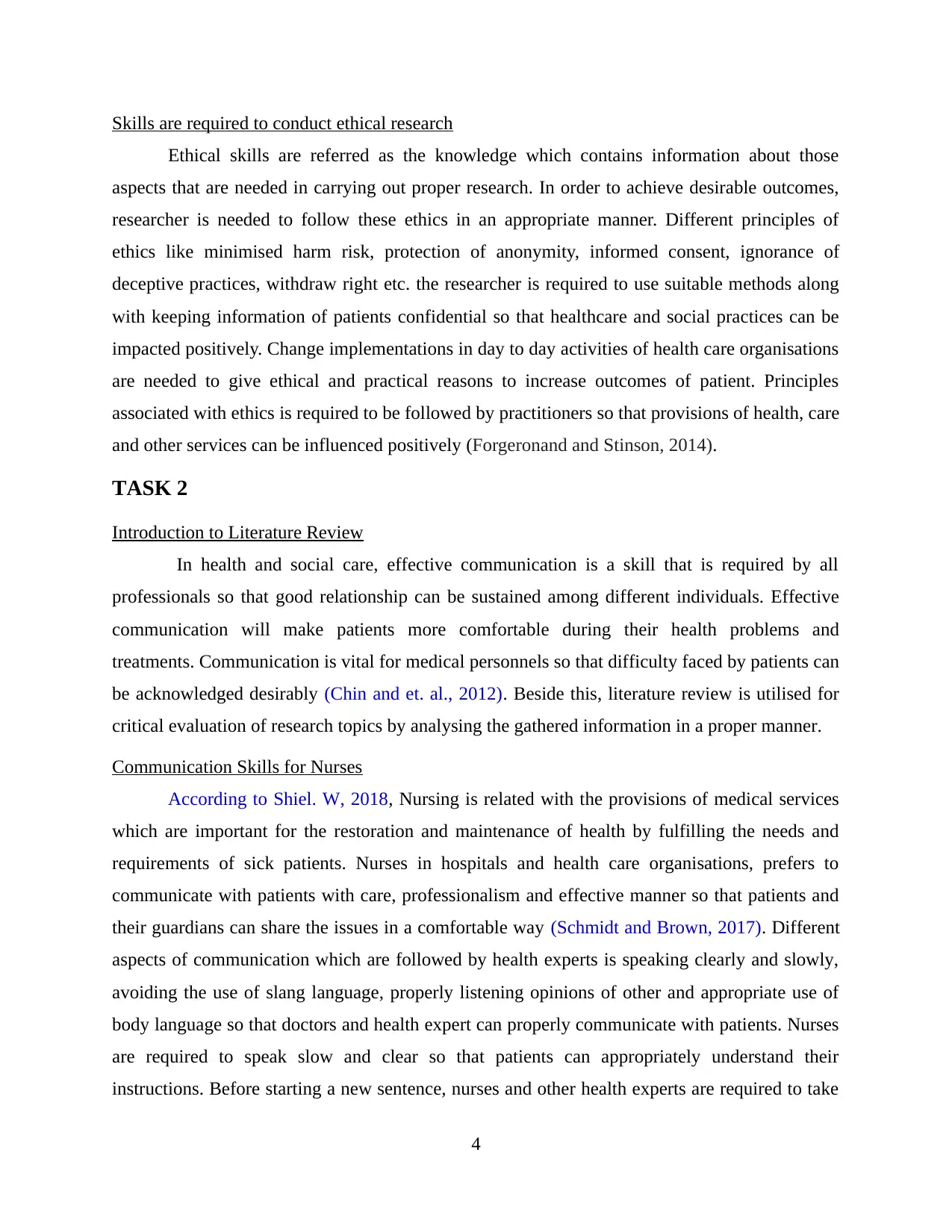
Skills are required to conduct ethical research
Ethical skills are referred as the knowledge which contains information about those
aspects that are needed in carrying out proper research. In order to achieve desirable outcomes,
researcher is needed to follow these ethics in an appropriate manner. Different principles of
ethics like minimised harm risk, protection of anonymity, informed consent, ignorance of
deceptive practices, withdraw right etc. the researcher is required to use suitable methods along
with keeping information of patients confidential so that healthcare and social practices can be
impacted positively. Change implementations in day to day activities of health care organisations
are needed to give ethical and practical reasons to increase outcomes of patient. Principles
associated with ethics is required to be followed by practitioners so that provisions of health, care
and other services can be influenced positively (Forgeronand and Stinson, 2014).
TASK 2
Introduction to Literature Review
In health and social care, effective communication is a skill that is required by all
professionals so that good relationship can be sustained among different individuals. Effective
communication will make patients more comfortable during their health problems and
treatments. Communication is vital for medical personnels so that difficulty faced by patients can
be acknowledged desirably (Chin and et. al., 2012). Beside this, literature review is utilised for
critical evaluation of research topics by analysing the gathered information in a proper manner.
Communication Skills for Nurses
According to Shiel. W, 2018, Nursing is related with the provisions of medical services
which are important for the restoration and maintenance of health by fulfilling the needs and
requirements of sick patients. Nurses in hospitals and health care organisations, prefers to
communicate with patients with care, professionalism and effective manner so that patients and
their guardians can share the issues in a comfortable way (Schmidt and Brown, 2017). Different
aspects of communication which are followed by health experts is speaking clearly and slowly,
avoiding the use of slang language, properly listening opinions of other and appropriate use of
body language so that doctors and health expert can properly communicate with patients. Nurses
are required to speak slow and clear so that patients can appropriately understand their
instructions. Before starting a new sentence, nurses and other health experts are required to take
4
Ethical skills are referred as the knowledge which contains information about those
aspects that are needed in carrying out proper research. In order to achieve desirable outcomes,
researcher is needed to follow these ethics in an appropriate manner. Different principles of
ethics like minimised harm risk, protection of anonymity, informed consent, ignorance of
deceptive practices, withdraw right etc. the researcher is required to use suitable methods along
with keeping information of patients confidential so that healthcare and social practices can be
impacted positively. Change implementations in day to day activities of health care organisations
are needed to give ethical and practical reasons to increase outcomes of patient. Principles
associated with ethics is required to be followed by practitioners so that provisions of health, care
and other services can be influenced positively (Forgeronand and Stinson, 2014).
TASK 2
Introduction to Literature Review
In health and social care, effective communication is a skill that is required by all
professionals so that good relationship can be sustained among different individuals. Effective
communication will make patients more comfortable during their health problems and
treatments. Communication is vital for medical personnels so that difficulty faced by patients can
be acknowledged desirably (Chin and et. al., 2012). Beside this, literature review is utilised for
critical evaluation of research topics by analysing the gathered information in a proper manner.
Communication Skills for Nurses
According to Shiel. W, 2018, Nursing is related with the provisions of medical services
which are important for the restoration and maintenance of health by fulfilling the needs and
requirements of sick patients. Nurses in hospitals and health care organisations, prefers to
communicate with patients with care, professionalism and effective manner so that patients and
their guardians can share the issues in a comfortable way (Schmidt and Brown, 2017). Different
aspects of communication which are followed by health experts is speaking clearly and slowly,
avoiding the use of slang language, properly listening opinions of other and appropriate use of
body language so that doctors and health expert can properly communicate with patients. Nurses
are required to speak slow and clear so that patients can appropriately understand their
instructions. Before starting a new sentence, nurses and other health experts are required to take
4
⊘ This is a preview!⊘
Do you want full access?
Subscribe today to unlock all pages.

Trusted by 1+ million students worldwide
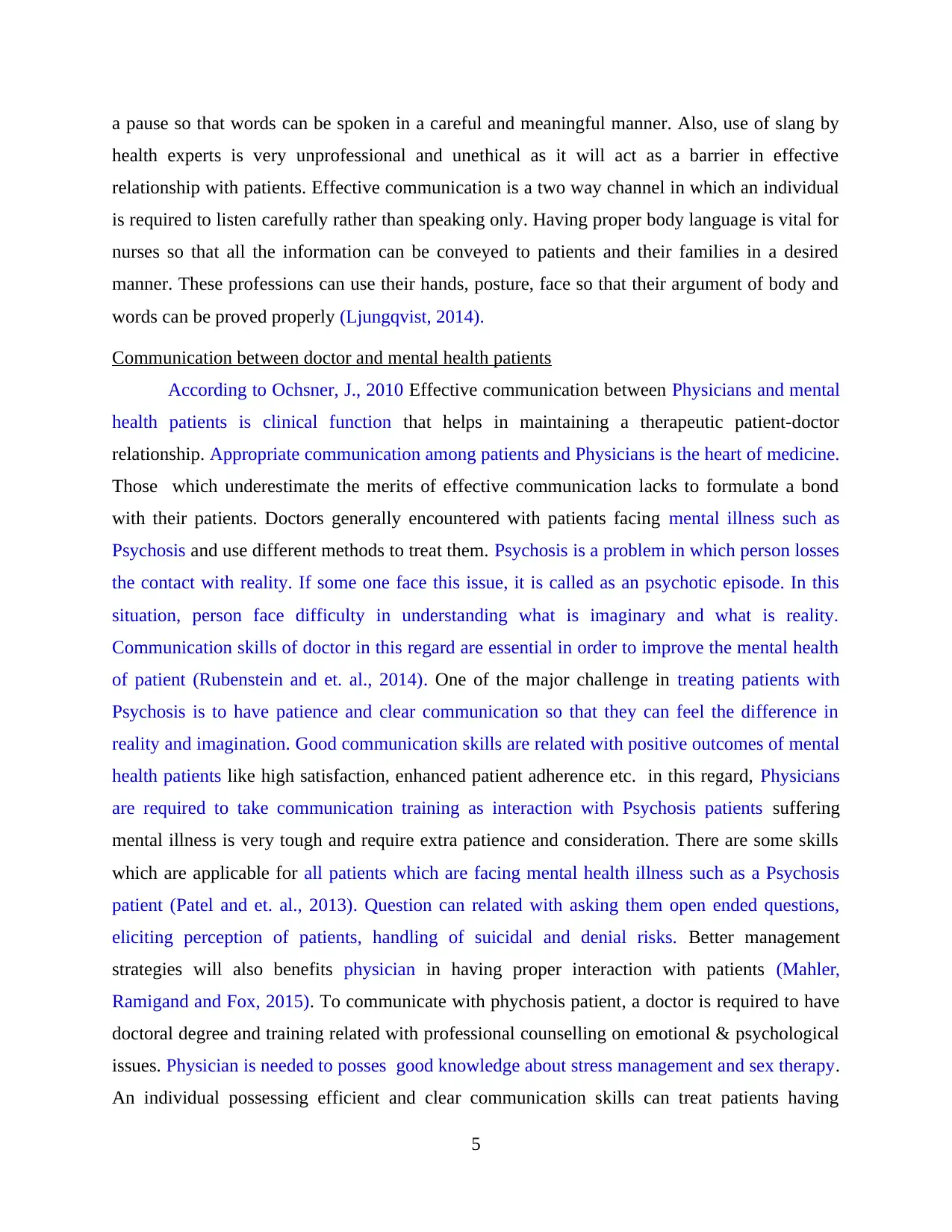
a pause so that words can be spoken in a careful and meaningful manner. Also, use of slang by
health experts is very unprofessional and unethical as it will act as a barrier in effective
relationship with patients. Effective communication is a two way channel in which an individual
is required to listen carefully rather than speaking only. Having proper body language is vital for
nurses so that all the information can be conveyed to patients and their families in a desired
manner. These professions can use their hands, posture, face so that their argument of body and
words can be proved properly (Ljungqvist, 2014).
Communication between doctor and mental health patients
According to Ochsner, J., 2010 Effective communication between Physicians and mental
health patients is clinical function that helps in maintaining a therapeutic patient-doctor
relationship. Appropriate communication among patients and Physicians is the heart of medicine.
Those which underestimate the merits of effective communication lacks to formulate a bond
with their patients. Doctors generally encountered with patients facing mental illness such as
Psychosis and use different methods to treat them. Psychosis is a problem in which person losses
the contact with reality. If some one face this issue, it is called as an psychotic episode. In this
situation, person face difficulty in understanding what is imaginary and what is reality.
Communication skills of doctor in this regard are essential in order to improve the mental health
of patient (Rubenstein and et. al., 2014). One of the major challenge in treating patients with
Psychosis is to have patience and clear communication so that they can feel the difference in
reality and imagination. Good communication skills are related with positive outcomes of mental
health patients like high satisfaction, enhanced patient adherence etc. in this regard, Physicians
are required to take communication training as interaction with Psychosis patients suffering
mental illness is very tough and require extra patience and consideration. There are some skills
which are applicable for all patients which are facing mental health illness such as a Psychosis
patient (Patel and et. al., 2013). Question can related with asking them open ended questions,
eliciting perception of patients, handling of suicidal and denial risks. Better management
strategies will also benefits physician in having proper interaction with patients (Mahler,
Ramigand and Fox, 2015). To communicate with phychosis patient, a doctor is required to have
doctoral degree and training related with professional counselling on emotional & psychological
issues. Physician is needed to posses good knowledge about stress management and sex therapy.
An individual possessing efficient and clear communication skills can treat patients having
5
health experts is very unprofessional and unethical as it will act as a barrier in effective
relationship with patients. Effective communication is a two way channel in which an individual
is required to listen carefully rather than speaking only. Having proper body language is vital for
nurses so that all the information can be conveyed to patients and their families in a desired
manner. These professions can use their hands, posture, face so that their argument of body and
words can be proved properly (Ljungqvist, 2014).
Communication between doctor and mental health patients
According to Ochsner, J., 2010 Effective communication between Physicians and mental
health patients is clinical function that helps in maintaining a therapeutic patient-doctor
relationship. Appropriate communication among patients and Physicians is the heart of medicine.
Those which underestimate the merits of effective communication lacks to formulate a bond
with their patients. Doctors generally encountered with patients facing mental illness such as
Psychosis and use different methods to treat them. Psychosis is a problem in which person losses
the contact with reality. If some one face this issue, it is called as an psychotic episode. In this
situation, person face difficulty in understanding what is imaginary and what is reality.
Communication skills of doctor in this regard are essential in order to improve the mental health
of patient (Rubenstein and et. al., 2014). One of the major challenge in treating patients with
Psychosis is to have patience and clear communication so that they can feel the difference in
reality and imagination. Good communication skills are related with positive outcomes of mental
health patients like high satisfaction, enhanced patient adherence etc. in this regard, Physicians
are required to take communication training as interaction with Psychosis patients suffering
mental illness is very tough and require extra patience and consideration. There are some skills
which are applicable for all patients which are facing mental health illness such as a Psychosis
patient (Patel and et. al., 2013). Question can related with asking them open ended questions,
eliciting perception of patients, handling of suicidal and denial risks. Better management
strategies will also benefits physician in having proper interaction with patients (Mahler,
Ramigand and Fox, 2015). To communicate with phychosis patient, a doctor is required to have
doctoral degree and training related with professional counselling on emotional & psychological
issues. Physician is needed to posses good knowledge about stress management and sex therapy.
An individual possessing efficient and clear communication skills can treat patients having
5
Paraphrase This Document
Need a fresh take? Get an instant paraphrase of this document with our AI Paraphraser
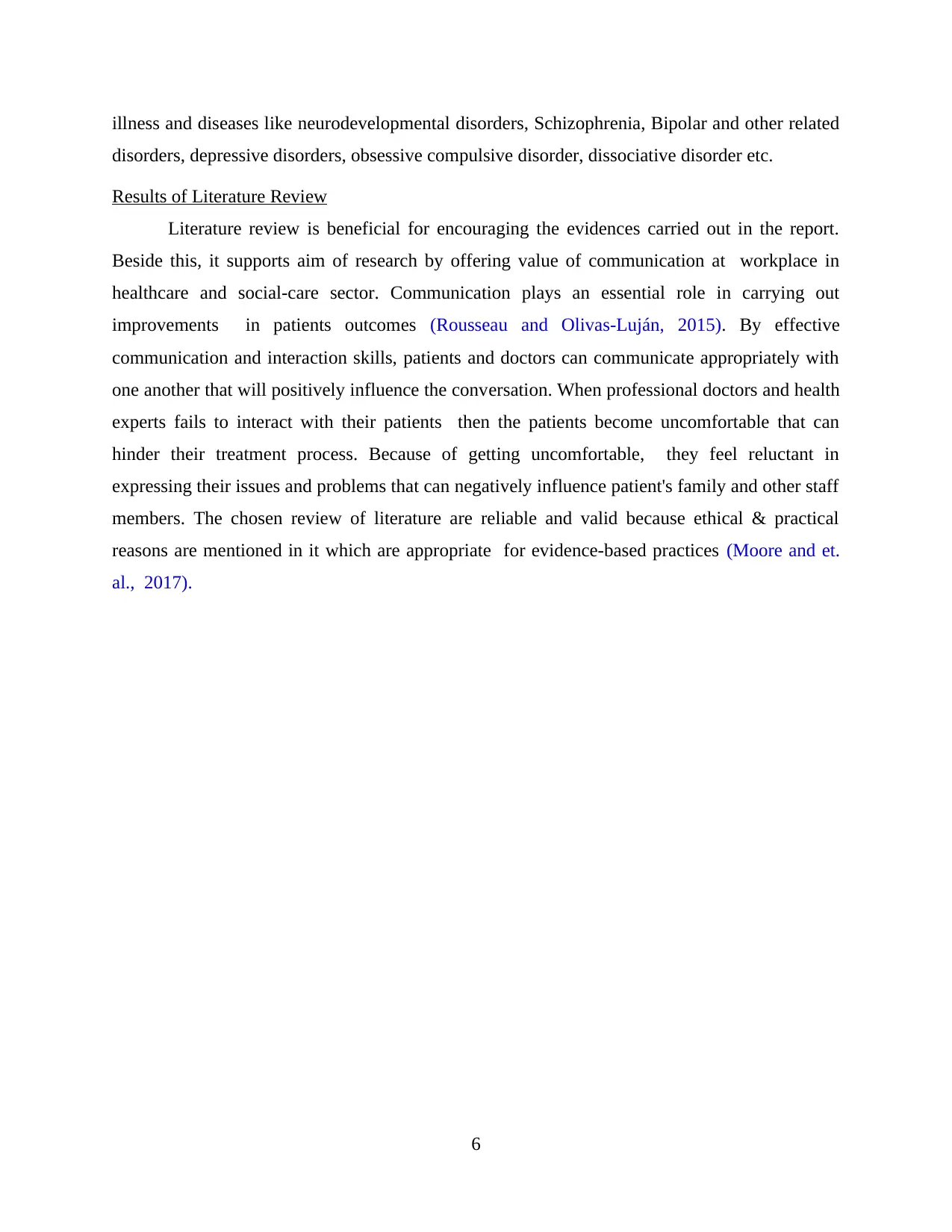
illness and diseases like neurodevelopmental disorders, Schizophrenia, Bipolar and other related
disorders, depressive disorders, obsessive compulsive disorder, dissociative disorder etc.
Results of Literature Review
Literature review is beneficial for encouraging the evidences carried out in the report.
Beside this, it supports aim of research by offering value of communication at workplace in
healthcare and social-care sector. Communication plays an essential role in carrying out
improvements in patients outcomes (Rousseau and Olivas‐Luján, 2015). By effective
communication and interaction skills, patients and doctors can communicate appropriately with
one another that will positively influence the conversation. When professional doctors and health
experts fails to interact with their patients then the patients become uncomfortable that can
hinder their treatment process. Because of getting uncomfortable, they feel reluctant in
expressing their issues and problems that can negatively influence patient's family and other staff
members. The chosen review of literature are reliable and valid because ethical & practical
reasons are mentioned in it which are appropriate for evidence-based practices (Moore and et.
al., 2017).
6
disorders, depressive disorders, obsessive compulsive disorder, dissociative disorder etc.
Results of Literature Review
Literature review is beneficial for encouraging the evidences carried out in the report.
Beside this, it supports aim of research by offering value of communication at workplace in
healthcare and social-care sector. Communication plays an essential role in carrying out
improvements in patients outcomes (Rousseau and Olivas‐Luján, 2015). By effective
communication and interaction skills, patients and doctors can communicate appropriately with
one another that will positively influence the conversation. When professional doctors and health
experts fails to interact with their patients then the patients become uncomfortable that can
hinder their treatment process. Because of getting uncomfortable, they feel reluctant in
expressing their issues and problems that can negatively influence patient's family and other staff
members. The chosen review of literature are reliable and valid because ethical & practical
reasons are mentioned in it which are appropriate for evidence-based practices (Moore and et.
al., 2017).
6
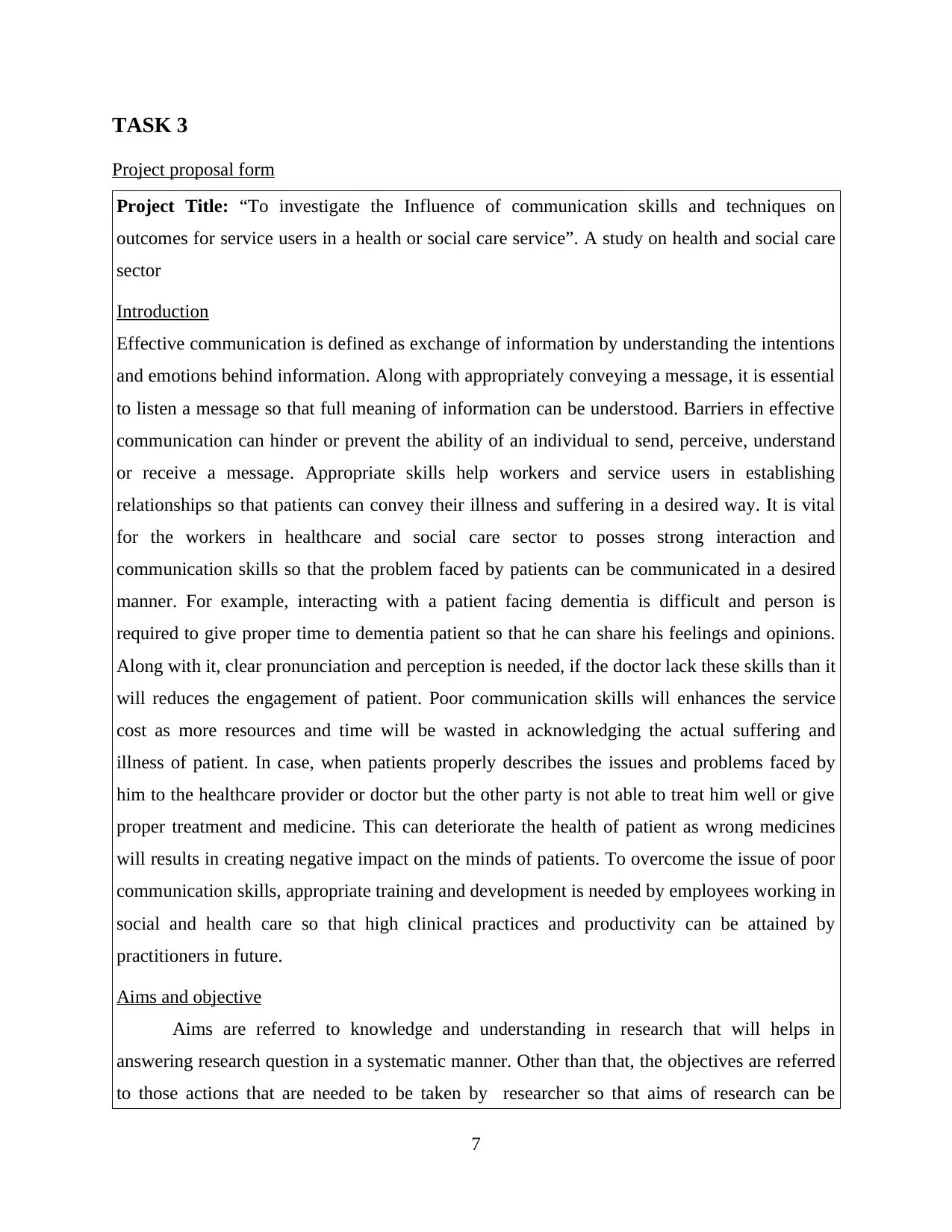
TASK 3
Project proposal form
Project Title: “To investigate the Influence of communication skills and techniques on
outcomes for service users in a health or social care service”. A study on health and social care
sector
Introduction
Effective communication is defined as exchange of information by understanding the intentions
and emotions behind information. Along with appropriately conveying a message, it is essential
to listen a message so that full meaning of information can be understood. Barriers in effective
communication can hinder or prevent the ability of an individual to send, perceive, understand
or receive a message. Appropriate skills help workers and service users in establishing
relationships so that patients can convey their illness and suffering in a desired way. It is vital
for the workers in healthcare and social care sector to posses strong interaction and
communication skills so that the problem faced by patients can be communicated in a desired
manner. For example, interacting with a patient facing dementia is difficult and person is
required to give proper time to dementia patient so that he can share his feelings and opinions.
Along with it, clear pronunciation and perception is needed, if the doctor lack these skills than it
will reduces the engagement of patient. Poor communication skills will enhances the service
cost as more resources and time will be wasted in acknowledging the actual suffering and
illness of patient. In case, when patients properly describes the issues and problems faced by
him to the healthcare provider or doctor but the other party is not able to treat him well or give
proper treatment and medicine. This can deteriorate the health of patient as wrong medicines
will results in creating negative impact on the minds of patients. To overcome the issue of poor
communication skills, appropriate training and development is needed by employees working in
social and health care so that high clinical practices and productivity can be attained by
practitioners in future.
Aims and objective
Aims are referred to knowledge and understanding in research that will helps in
answering research question in a systematic manner. Other than that, the objectives are referred
to those actions that are needed to be taken by researcher so that aims of research can be
7
Project proposal form
Project Title: “To investigate the Influence of communication skills and techniques on
outcomes for service users in a health or social care service”. A study on health and social care
sector
Introduction
Effective communication is defined as exchange of information by understanding the intentions
and emotions behind information. Along with appropriately conveying a message, it is essential
to listen a message so that full meaning of information can be understood. Barriers in effective
communication can hinder or prevent the ability of an individual to send, perceive, understand
or receive a message. Appropriate skills help workers and service users in establishing
relationships so that patients can convey their illness and suffering in a desired way. It is vital
for the workers in healthcare and social care sector to posses strong interaction and
communication skills so that the problem faced by patients can be communicated in a desired
manner. For example, interacting with a patient facing dementia is difficult and person is
required to give proper time to dementia patient so that he can share his feelings and opinions.
Along with it, clear pronunciation and perception is needed, if the doctor lack these skills than it
will reduces the engagement of patient. Poor communication skills will enhances the service
cost as more resources and time will be wasted in acknowledging the actual suffering and
illness of patient. In case, when patients properly describes the issues and problems faced by
him to the healthcare provider or doctor but the other party is not able to treat him well or give
proper treatment and medicine. This can deteriorate the health of patient as wrong medicines
will results in creating negative impact on the minds of patients. To overcome the issue of poor
communication skills, appropriate training and development is needed by employees working in
social and health care so that high clinical practices and productivity can be attained by
practitioners in future.
Aims and objective
Aims are referred to knowledge and understanding in research that will helps in
answering research question in a systematic manner. Other than that, the objectives are referred
to those actions that are needed to be taken by researcher so that aims of research can be
7
⊘ This is a preview!⊘
Do you want full access?
Subscribe today to unlock all pages.

Trusted by 1+ million students worldwide
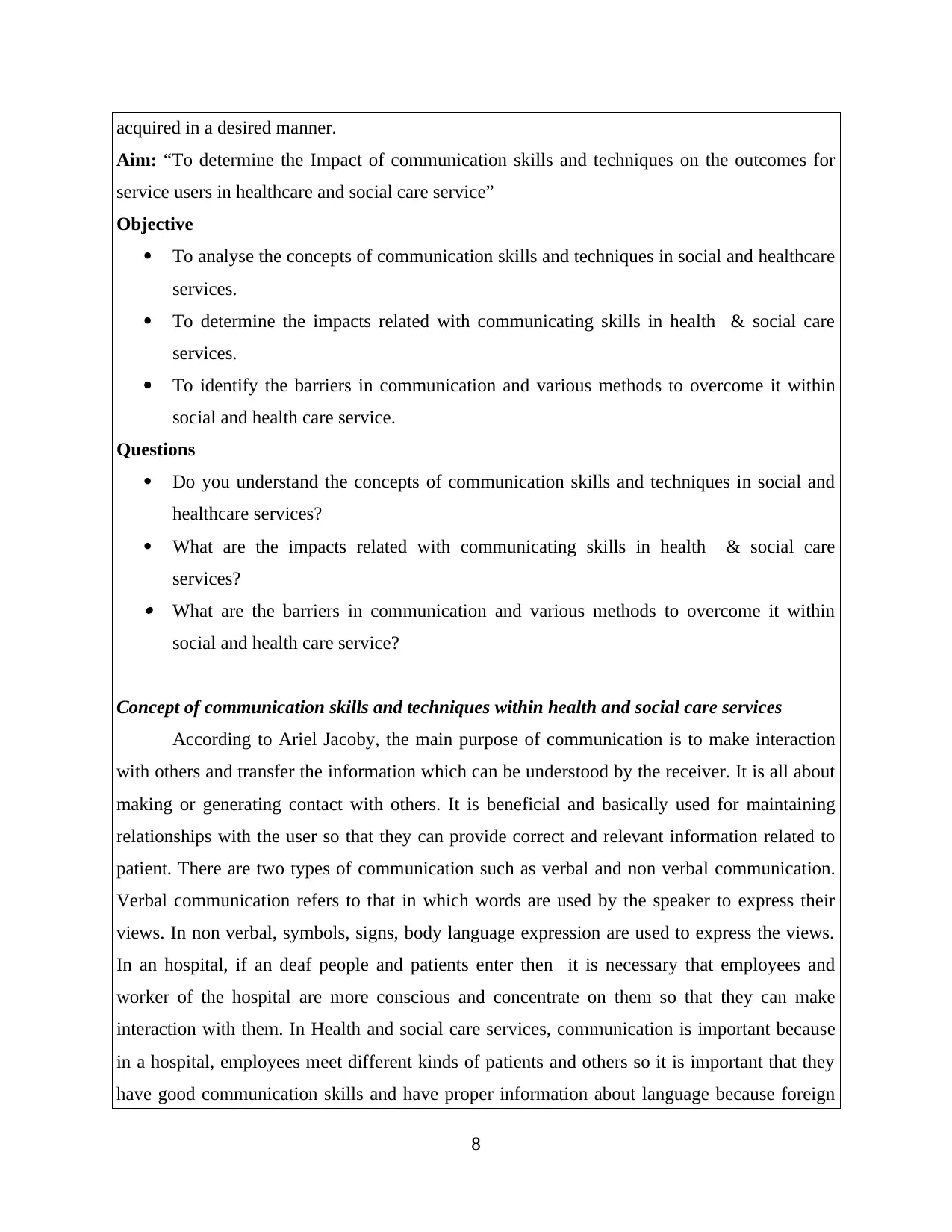
acquired in a desired manner.
Aim: “To determine the Impact of communication skills and techniques on the outcomes for
service users in healthcare and social care service”
Objective
To analyse the concepts of communication skills and techniques in social and healthcare
services.
To determine the impacts related with communicating skills in health & social care
services.
To identify the barriers in communication and various methods to overcome it within
social and health care service.
Questions
Do you understand the concepts of communication skills and techniques in social and
healthcare services?
What are the impacts related with communicating skills in health & social care
services? What are the barriers in communication and various methods to overcome it within
social and health care service?
Concept of communication skills and techniques within health and social care services
According to Ariel Jacoby, the main purpose of communication is to make interaction
with others and transfer the information which can be understood by the receiver. It is all about
making or generating contact with others. It is beneficial and basically used for maintaining
relationships with the user so that they can provide correct and relevant information related to
patient. There are two types of communication such as verbal and non verbal communication.
Verbal communication refers to that in which words are used by the speaker to express their
views. In non verbal, symbols, signs, body language expression are used to express the views.
In an hospital, if an deaf people and patients enter then it is necessary that employees and
worker of the hospital are more conscious and concentrate on them so that they can make
interaction with them. In Health and social care services, communication is important because
in a hospital, employees meet different kinds of patients and others so it is important that they
have good communication skills and have proper information about language because foreign
8
Aim: “To determine the Impact of communication skills and techniques on the outcomes for
service users in healthcare and social care service”
Objective
To analyse the concepts of communication skills and techniques in social and healthcare
services.
To determine the impacts related with communicating skills in health & social care
services.
To identify the barriers in communication and various methods to overcome it within
social and health care service.
Questions
Do you understand the concepts of communication skills and techniques in social and
healthcare services?
What are the impacts related with communicating skills in health & social care
services? What are the barriers in communication and various methods to overcome it within
social and health care service?
Concept of communication skills and techniques within health and social care services
According to Ariel Jacoby, the main purpose of communication is to make interaction
with others and transfer the information which can be understood by the receiver. It is all about
making or generating contact with others. It is beneficial and basically used for maintaining
relationships with the user so that they can provide correct and relevant information related to
patient. There are two types of communication such as verbal and non verbal communication.
Verbal communication refers to that in which words are used by the speaker to express their
views. In non verbal, symbols, signs, body language expression are used to express the views.
In an hospital, if an deaf people and patients enter then it is necessary that employees and
worker of the hospital are more conscious and concentrate on them so that they can make
interaction with them. In Health and social care services, communication is important because
in a hospital, employees meet different kinds of patients and others so it is important that they
have good communication skills and have proper information about language because foreign
8
Paraphrase This Document
Need a fresh take? Get an instant paraphrase of this document with our AI Paraphraser
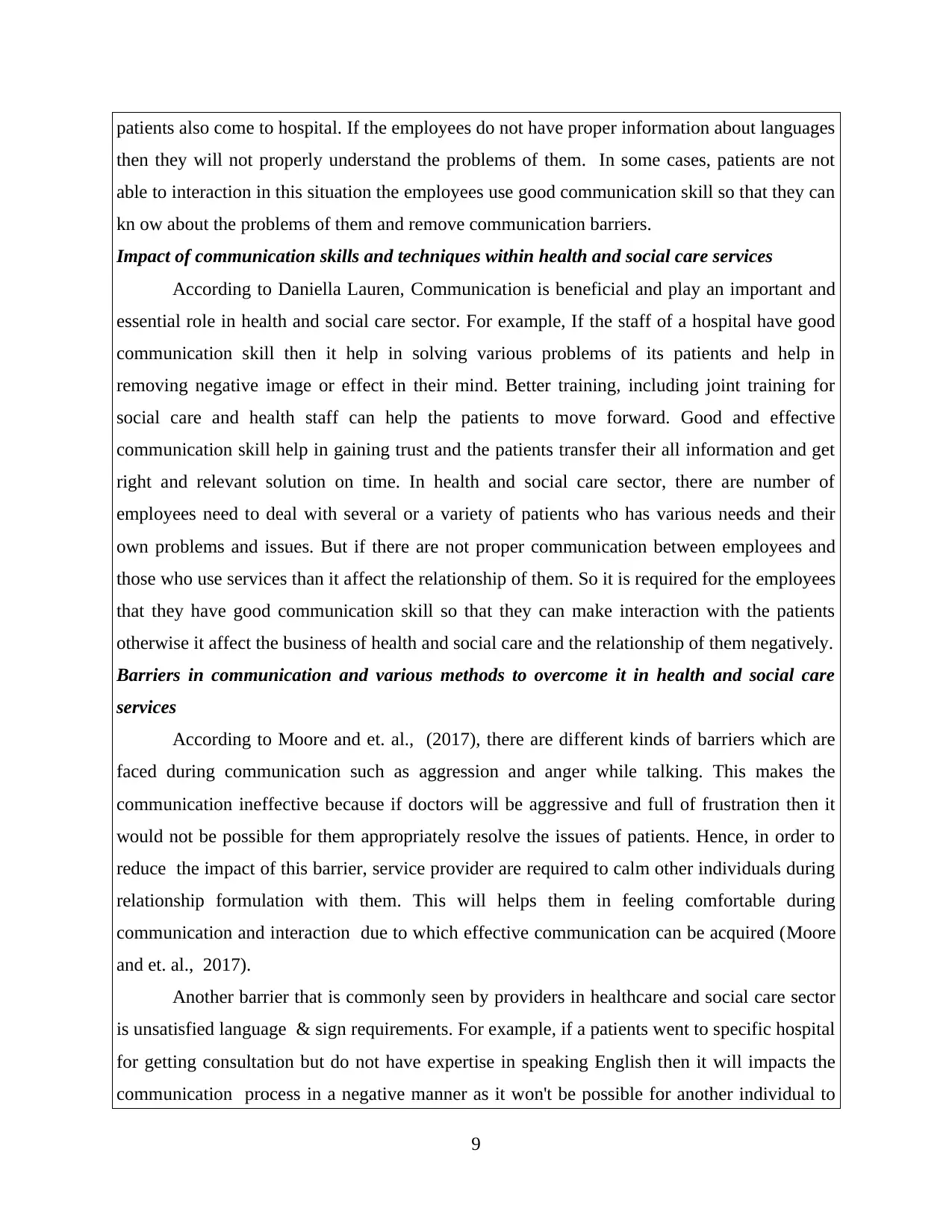
patients also come to hospital. If the employees do not have proper information about languages
then they will not properly understand the problems of them. In some cases, patients are not
able to interaction in this situation the employees use good communication skill so that they can
kn ow about the problems of them and remove communication barriers.
Impact of communication skills and techniques within health and social care services
According to Daniella Lauren, Communication is beneficial and play an important and
essential role in health and social care sector. For example, If the staff of a hospital have good
communication skill then it help in solving various problems of its patients and help in
removing negative image or effect in their mind. Better training, including joint training for
social care and health staff can help the patients to move forward. Good and effective
communication skill help in gaining trust and the patients transfer their all information and get
right and relevant solution on time. In health and social care sector, there are number of
employees need to deal with several or a variety of patients who has various needs and their
own problems and issues. But if there are not proper communication between employees and
those who use services than it affect the relationship of them. So it is required for the employees
that they have good communication skill so that they can make interaction with the patients
otherwise it affect the business of health and social care and the relationship of them negatively.
Barriers in communication and various methods to overcome it in health and social care
services
According to Moore and et. al., (2017), there are different kinds of barriers which are
faced during communication such as aggression and anger while talking. This makes the
communication ineffective because if doctors will be aggressive and full of frustration then it
would not be possible for them appropriately resolve the issues of patients. Hence, in order to
reduce the impact of this barrier, service provider are required to calm other individuals during
relationship formulation with them. This will helps them in feeling comfortable during
communication and interaction due to which effective communication can be acquired (Moore
and et. al., 2017).
Another barrier that is commonly seen by providers in healthcare and social care sector
is unsatisfied language & sign requirements. For example, if a patients went to specific hospital
for getting consultation but do not have expertise in speaking English then it will impacts the
communication process in a negative manner as it won't be possible for another individual to
9
then they will not properly understand the problems of them. In some cases, patients are not
able to interaction in this situation the employees use good communication skill so that they can
kn ow about the problems of them and remove communication barriers.
Impact of communication skills and techniques within health and social care services
According to Daniella Lauren, Communication is beneficial and play an important and
essential role in health and social care sector. For example, If the staff of a hospital have good
communication skill then it help in solving various problems of its patients and help in
removing negative image or effect in their mind. Better training, including joint training for
social care and health staff can help the patients to move forward. Good and effective
communication skill help in gaining trust and the patients transfer their all information and get
right and relevant solution on time. In health and social care sector, there are number of
employees need to deal with several or a variety of patients who has various needs and their
own problems and issues. But if there are not proper communication between employees and
those who use services than it affect the relationship of them. So it is required for the employees
that they have good communication skill so that they can make interaction with the patients
otherwise it affect the business of health and social care and the relationship of them negatively.
Barriers in communication and various methods to overcome it in health and social care
services
According to Moore and et. al., (2017), there are different kinds of barriers which are
faced during communication such as aggression and anger while talking. This makes the
communication ineffective because if doctors will be aggressive and full of frustration then it
would not be possible for them appropriately resolve the issues of patients. Hence, in order to
reduce the impact of this barrier, service provider are required to calm other individuals during
relationship formulation with them. This will helps them in feeling comfortable during
communication and interaction due to which effective communication can be acquired (Moore
and et. al., 2017).
Another barrier that is commonly seen by providers in healthcare and social care sector
is unsatisfied language & sign requirements. For example, if a patients went to specific hospital
for getting consultation but do not have expertise in speaking English then it will impacts the
communication process in a negative manner as it won't be possible for another individual to
9
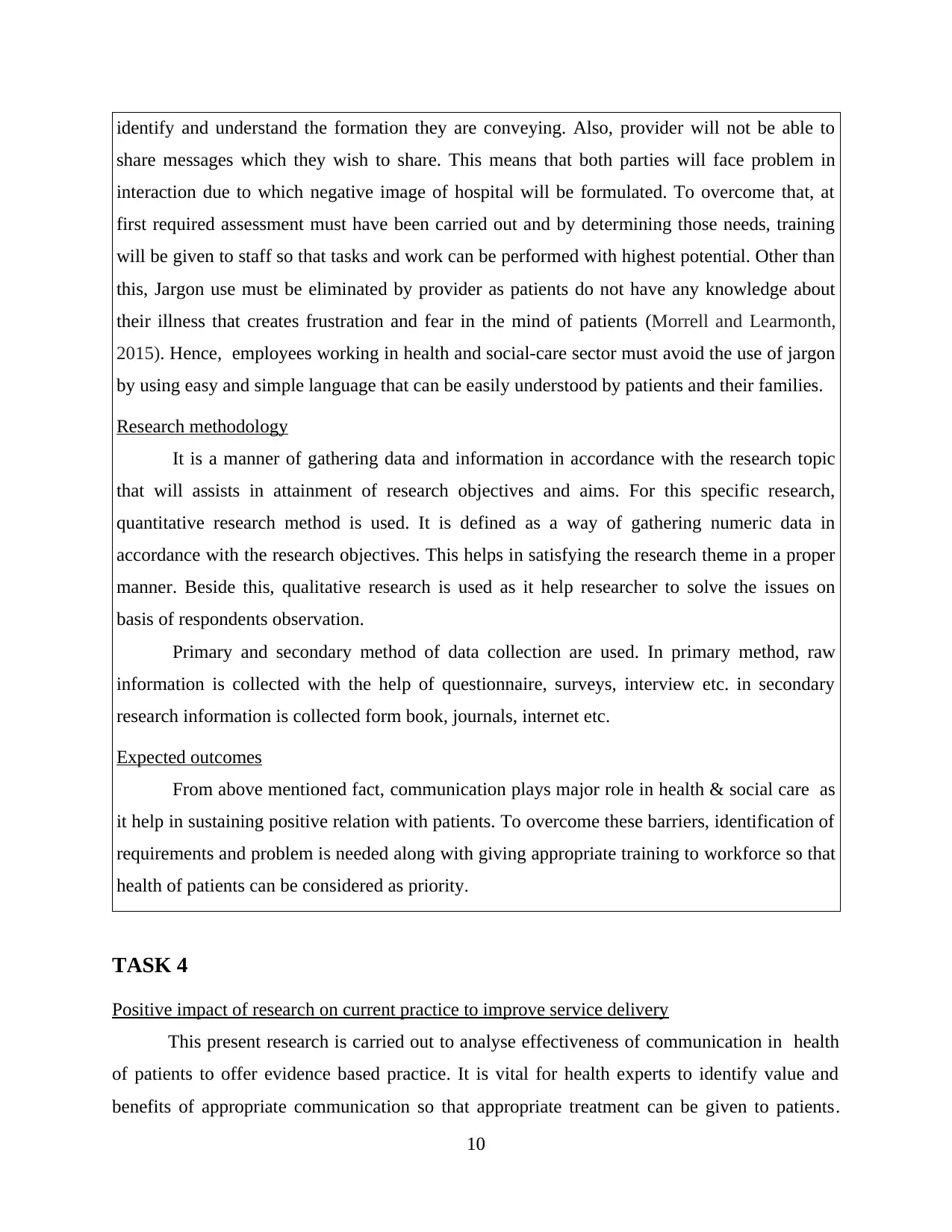
identify and understand the formation they are conveying. Also, provider will not be able to
share messages which they wish to share. This means that both parties will face problem in
interaction due to which negative image of hospital will be formulated. To overcome that, at
first required assessment must have been carried out and by determining those needs, training
will be given to staff so that tasks and work can be performed with highest potential. Other than
this, Jargon use must be eliminated by provider as patients do not have any knowledge about
their illness that creates frustration and fear in the mind of patients (Morrell and Learmonth,
2015). Hence, employees working in health and social-care sector must avoid the use of jargon
by using easy and simple language that can be easily understood by patients and their families.
Research methodology
It is a manner of gathering data and information in accordance with the research topic
that will assists in attainment of research objectives and aims. For this specific research,
quantitative research method is used. It is defined as a way of gathering numeric data in
accordance with the research objectives. This helps in satisfying the research theme in a proper
manner. Beside this, qualitative research is used as it help researcher to solve the issues on
basis of respondents observation.
Primary and secondary method of data collection are used. In primary method, raw
information is collected with the help of questionnaire, surveys, interview etc. in secondary
research information is collected form book, journals, internet etc.
Expected outcomes
From above mentioned fact, communication plays major role in health & social care as
it help in sustaining positive relation with patients. To overcome these barriers, identification of
requirements and problem is needed along with giving appropriate training to workforce so that
health of patients can be considered as priority.
TASK 4
Positive impact of research on current practice to improve service delivery
This present research is carried out to analyse effectiveness of communication in health
of patients to offer evidence based practice. It is vital for health experts to identify value and
benefits of appropriate communication so that appropriate treatment can be given to patients.
10
share messages which they wish to share. This means that both parties will face problem in
interaction due to which negative image of hospital will be formulated. To overcome that, at
first required assessment must have been carried out and by determining those needs, training
will be given to staff so that tasks and work can be performed with highest potential. Other than
this, Jargon use must be eliminated by provider as patients do not have any knowledge about
their illness that creates frustration and fear in the mind of patients (Morrell and Learmonth,
2015). Hence, employees working in health and social-care sector must avoid the use of jargon
by using easy and simple language that can be easily understood by patients and their families.
Research methodology
It is a manner of gathering data and information in accordance with the research topic
that will assists in attainment of research objectives and aims. For this specific research,
quantitative research method is used. It is defined as a way of gathering numeric data in
accordance with the research objectives. This helps in satisfying the research theme in a proper
manner. Beside this, qualitative research is used as it help researcher to solve the issues on
basis of respondents observation.
Primary and secondary method of data collection are used. In primary method, raw
information is collected with the help of questionnaire, surveys, interview etc. in secondary
research information is collected form book, journals, internet etc.
Expected outcomes
From above mentioned fact, communication plays major role in health & social care as
it help in sustaining positive relation with patients. To overcome these barriers, identification of
requirements and problem is needed along with giving appropriate training to workforce so that
health of patients can be considered as priority.
TASK 4
Positive impact of research on current practice to improve service delivery
This present research is carried out to analyse effectiveness of communication in health
of patients to offer evidence based practice. It is vital for health experts to identify value and
benefits of appropriate communication so that appropriate treatment can be given to patients.
10
⊘ This is a preview!⊘
Do you want full access?
Subscribe today to unlock all pages.

Trusted by 1+ million students worldwide
1 out of 15
Related Documents
Your All-in-One AI-Powered Toolkit for Academic Success.
+13062052269
info@desklib.com
Available 24*7 on WhatsApp / Email
![[object Object]](/_next/static/media/star-bottom.7253800d.svg)
Unlock your academic potential
Copyright © 2020–2026 A2Z Services. All Rights Reserved. Developed and managed by ZUCOL.





